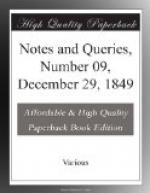He was a most accomplished scholar and a learned antiquary. He had his foibles, it is true, but they were redeemed by qualities of high and enduring excellence. The eloquence of his parliamentary speeches has elicited the admiration of Southey; to praise them therefore now were superfluous. The noble library which he formed at Surrenden, and the invaluable collection of charters which he amassed there, during his unhappily brief career, testify to his ardour in literary pursuits. The library and a large part of the MSS. are unhappily dispersed. Of the former, all that remains to tell of what it once was, are a few scattered notices among the family records, and the titles of books, with their cost, as they are entered in the weekly accounts of our “household book.” Of the latter there yet remain a few thousand charters and rolls, some of them of great interest, with exquisite seals attached. I shall be able occasionally to send you a few “notes” on these heads, from the “household book,” and, in contemplating the remains of this unrivalled collection of its day, I can well bespeak the sympathy of every true-hearted “Chartist” and Bibliographer, in the lament which has often been mine—“Quanta fuisti cum tantae sint reliquiae!”
Lambert B. Larking.
Ryarsh Vicarage, Dec. 12. 1849.
* * * * *
Berkeley’s theory of vision vindicated.
In reply to the query of “B.G.” (p. 107. of your 7th No.), I beg to say that Bishop Berkeley’s Theory of Vision Vindicated does not occur either in the 4to. or 8vo. editions of his collected works; but there is a copy of it in the library of Trinity College, Dublin, from which I transcribe the full title as follows:—
“The Theory of Vision,
or Visual Language, shewing the immediate
Presence and Providence of
a Deity, vindicated and explained. By
the author of Alciphron, or
The Minute Philosopher.
“Acts, xvii. 28.
“In Him we live, and move, and have our being.
“Lond. Printed for J. Tonson in the Strand.
“MDCCXXXIII.”
Some other of the author’s tracts have also been omitted in his collected works; but, as I am now answering “a Query,” and not making “a Note,” I shall reserve what I might say of them for another opportunity. The memory of Berkeley is dear to every member of this University; and therefore I hope you will permit me to say one word, in defence of his character, against Dugald Stewart’s charge of having been “provoked,” by Lord Shaftesbury’s Characteristics, “to a harshness equally unwonted and unwarranted.”




